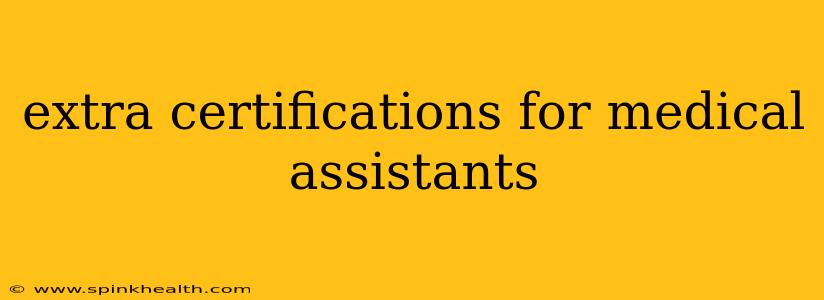The life of a medical assistant is a whirlwind of activity – from taking vital signs and prepping patients to assisting with procedures and managing medical records. It's a demanding yet incredibly rewarding career path, and for those looking to climb the ladder of success or specialize in a specific area, pursuing extra certifications can be a game-changer. This isn't just about adding lines to your resume; it's about demonstrating a commitment to excellence, expanding your skill set, and opening doors to more lucrative and fulfilling opportunities. Let's explore some of the popular and valuable certifications medical assistants can pursue.
Why Pursue Extra Certifications?
Before we dive into specific certifications, let's address the "why." Why invest your time and money in additional training? The benefits are plentiful:
- Increased Earning Potential: Certifications often translate directly into higher salaries. Employers recognize the value of specialized skills and are willing to pay for them.
- Enhanced Job Opportunities: A certification can make you a more competitive candidate, opening doors to jobs you might not otherwise qualify for.
- Career Advancement: Many certifications serve as stepping stones to management roles or specialized positions within the medical field.
- Professional Development: Continuing your education shows dedication to your profession and keeps you up-to-date on the latest advancements in medical technology and practices.
- Improved Patient Care: Specialized training allows you to provide better, more informed care to patients.
Popular Certifications for Medical Assistants
Now, let's explore some of the most sought-after certifications for medical assistants. The ideal certification will depend on your interests and career goals.
Certified Medical Assistant (CMA)
This is arguably the most well-known and widely recognized certification for medical assistants. It's offered by the American Association of Medical Assistants (AAMA) and demonstrates a strong foundation in clinical and administrative skills. Earning your CMA shows dedication to professional standards.
Registered Medical Assistant (RMA)
The RMA certification, offered by the American Medical Technologists (AMT), is another highly respected credential. It emphasizes both the clinical and administrative duties of a medical assistant, preparing you for a diverse range of roles.
Certified Clinical Medical Assistant (CCMA)
The National Healthcareer Association (NHA) offers the CCMA certification, focusing heavily on clinical skills. This certification is ideal if you're interested in a more hands-on role with a focus on patient care.
What are some certifications specific to certain medical fields?
Many medical assistants choose to specialize in a particular area of medicine. This focus can greatly enhance job opportunities and salary potential. Examples include:
- Certified Phlebotomy Technician (CPT): A crucial skill for any medical assistant, phlebotomy certification demonstrates proficiency in drawing blood samples – a common task in many medical settings.
- Electronic Health Records (EHR) Certification: With the increasing reliance on electronic health records, certification in EHR software (like Epic or Cerner) is highly valued.
- Certified Medical Administrative Assistant (CMAA): Focuses on the administrative side of medical assisting, including billing, coding, and scheduling.
What are the most in-demand certifications for medical assistants?
The demand for certifications shifts with technological advancements and evolving healthcare needs. Currently, certifications in EHR software, phlebotomy, and those emphasizing patient care are especially in-demand. Staying up-to-date on industry trends is key to choosing the most valuable certification for your long-term career goals.
How much do extra certifications for medical assistants cost?
The cost of certifications varies depending on the certifying organization and the specific certification. Expect to invest several hundred dollars in exam fees, study materials, and possibly preparatory courses. However, the return on investment (ROI) can be significant considering the increased earning potential and job opportunities.
How long does it take to get an extra certification as a medical assistant?
The timeframe for obtaining an extra certification depends on several factors, including your existing knowledge, the complexity of the certification, and the amount of time you dedicate to studying. Some certifications can be earned within a few months, while others may require more extensive training.
In conclusion, pursuing extra certifications as a medical assistant is an investment in your future. By expanding your skills and demonstrating your commitment to excellence, you can significantly enhance your career prospects and contribute to improved patient care. Remember to carefully research different certifications to find the one that best aligns with your career goals and interests.

